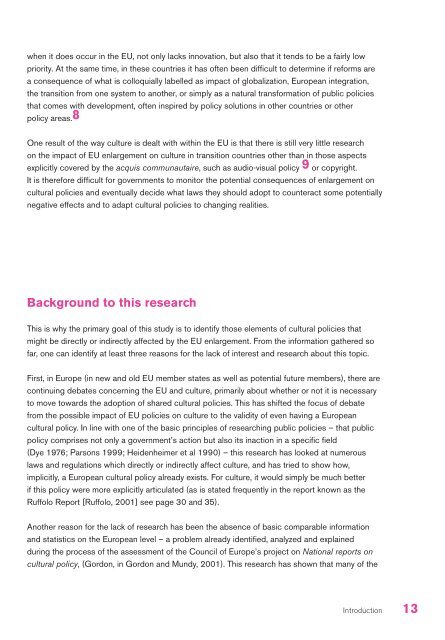Why we need European cultural policies: the impact of EU ...
Why we need European cultural policies: the impact of EU ...
Why we need European cultural policies: the impact of EU ...
Create successful ePaper yourself
Turn your PDF publications into a flip-book with our unique Google optimized e-Paper software.
when it does occur in <strong>the</strong> <strong>EU</strong>, not only lacks innovation, but also that it tends to be a fairly lowpriority. At <strong>the</strong> same time, in <strong>the</strong>se countries it has <strong>of</strong>ten been difficult to determine if reforms area consequence <strong>of</strong> what is colloquially labelled as <strong>impact</strong> <strong>of</strong> globalization, <strong>European</strong> integration,<strong>the</strong> transition from one system to ano<strong>the</strong>r, or simply as a natural transformation <strong>of</strong> public <strong>policies</strong>that comes with development, <strong>of</strong>ten inspired by policy solutions in o<strong>the</strong>r countries or o<strong>the</strong>rpolicy areas.8One result <strong>of</strong> <strong>the</strong> way culture is dealt with within <strong>the</strong> <strong>EU</strong> is that <strong>the</strong>re is still very little researchon <strong>the</strong> <strong>impact</strong> <strong>of</strong> <strong>EU</strong> enlargement on culture in transition countries o<strong>the</strong>r than in those aspectsexplicitly covered by <strong>the</strong> acquis communautaire, such as audio-visual policy 9 or copyright.It is <strong>the</strong>refore difficult for governments to monitor <strong>the</strong> potential consequences <strong>of</strong> enlargement on<strong>cultural</strong> <strong>policies</strong> and eventually decide what laws <strong>the</strong>y should adopt to counteract some potentiallynegative effects and to adapt <strong>cultural</strong> <strong>policies</strong> to changing realities.Background to this researchThis is why <strong>the</strong> primary goal <strong>of</strong> this study is to identify those elements <strong>of</strong> <strong>cultural</strong> <strong>policies</strong> thatmight be directly or indirectly affected by <strong>the</strong> <strong>EU</strong> enlargement. From <strong>the</strong> information ga<strong>the</strong>red s<strong>of</strong>ar, one can identify at least three reasons for <strong>the</strong> lack <strong>of</strong> interest and research about this topic.First, in Europe (in new and old <strong>EU</strong> member states as <strong>we</strong>ll as potential future members), <strong>the</strong>re arecontinuing debates concerning <strong>the</strong> <strong>EU</strong> and culture, primarily about whe<strong>the</strong>r or not it is necessaryto move towards <strong>the</strong> adoption <strong>of</strong> shared <strong>cultural</strong> <strong>policies</strong>. This has shifted <strong>the</strong> focus <strong>of</strong> debatefrom <strong>the</strong> possible <strong>impact</strong> <strong>of</strong> <strong>EU</strong> <strong>policies</strong> on culture to <strong>the</strong> validity <strong>of</strong> even having a <strong>European</strong><strong>cultural</strong> policy. In line with one <strong>of</strong> <strong>the</strong> basic principles <strong>of</strong> researching public <strong>policies</strong> – that publicpolicy comprises not only a government’s action but also its inaction in a specific field(Dye 1976; Parsons 1999; Heidenheimer et al 1990) – this research has looked at numerouslaws and regulations which directly or indirectly affect culture, and has tried to show how,implicitly, a <strong>European</strong> <strong>cultural</strong> policy already exists. For culture, it would simply be much betterif this policy <strong>we</strong>re more explicitly articulated (as is stated frequently in <strong>the</strong> report known as <strong>the</strong>Ruffolo Report [Ruffolo, 2001] see page 30 and 35).Ano<strong>the</strong>r reason for <strong>the</strong> lack <strong>of</strong> research has been <strong>the</strong> absence <strong>of</strong> basic comparable informationand statistics on <strong>the</strong> <strong>European</strong> level – a problem already identified, analyzed and explainedduring <strong>the</strong> process <strong>of</strong> <strong>the</strong> assessment <strong>of</strong> <strong>the</strong> Council <strong>of</strong> Europe’s project on National reports on<strong>cultural</strong> policy, (Gordon, in Gordon and Mundy, 2001). This research has shown that many <strong>of</strong> <strong>the</strong>Introduction13














